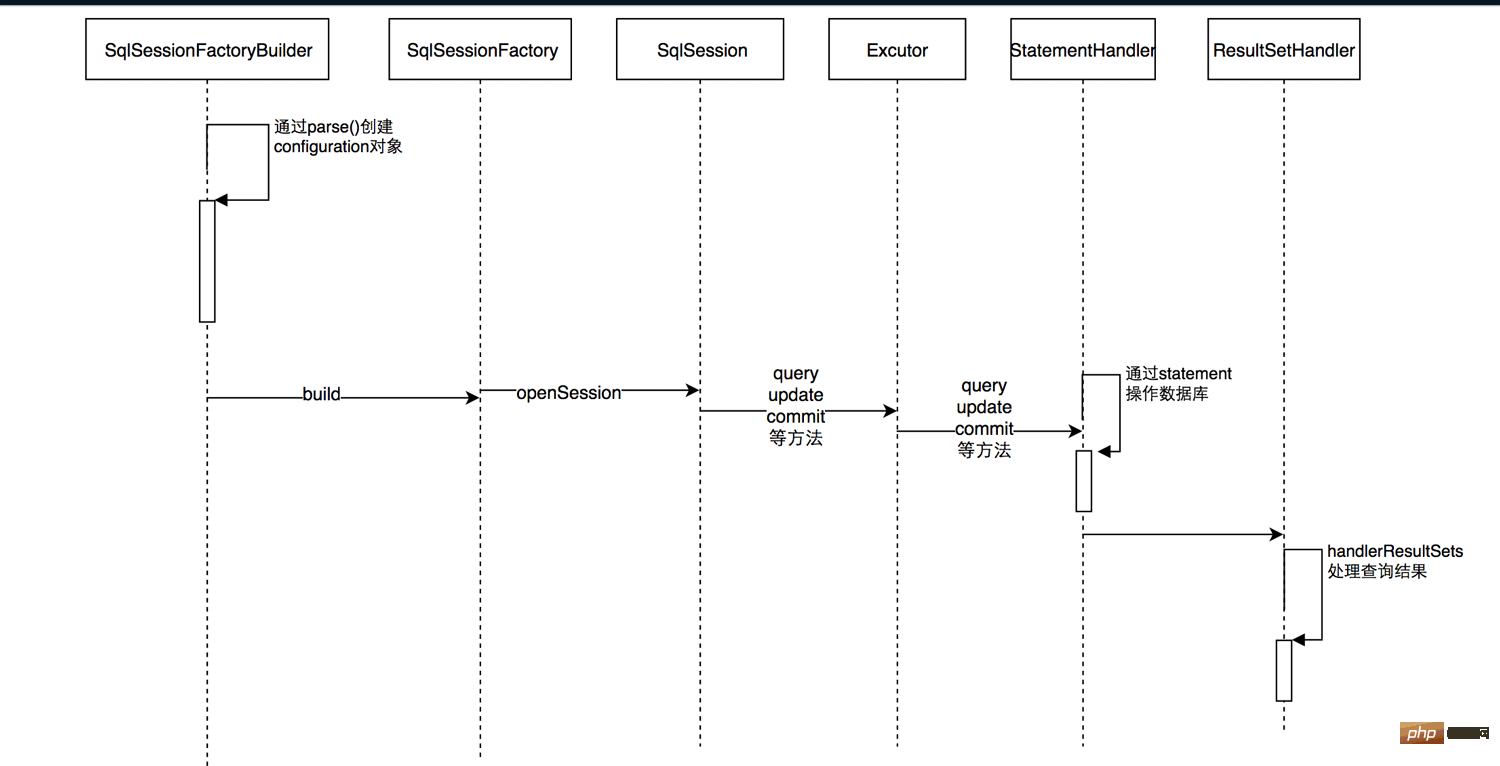Home >Java >javaTutorial >How to use springboot+mybatis interceptor to implement horizontal table splitting
How to use springboot+mybatis interceptor to implement horizontal table splitting
- WBOYWBOYWBOYWBOYWBOYWBOYWBOYWBOYWBOYWBOYWBOYWBOYWBforward
- 2023-05-14 18:43:171804browse
MyBatis allows the use of plug-ins to intercept methods
Executor (update, query, flushStatements, commit, rollback, getTransaction, close, isClosed)
-
ParameterHandler (getParameterObject, setParameters)
ResultSetHandler (handleResultSets, handleOutputParameters)
StatementHandler (prepare, parameterize, batch, update, query )
##The overall summary is:
- Methods to intercept the executor
- Processing of interception parameters
- Processing of interception result set
- Processing of interception of Sql syntax construction

package org.apache.ibatis.plugin;
import java.util.Properties;
public interface Interceptor {
//intercept方法就是要进行拦截的时候要执行的方法。
Object intercept(Invocation invocation) throws Throwable;
//plugin方法是拦截器用于封装目标对象的,通过该方法我们可以返回目标对象本身,也可以返回一个它的代理。当返回的是代理的时候我们可以对其中的方法进行拦截来调用intercept方法,当然也可以调用其他方法。
Object plugin(Object target);
//setProperties方法是用于在Mybatis配置文件中指定一些属性的。
void setProperties(Properties properties);
}
Sub-table implementation1. General ideaThe table structure of the sub-table has been pre-prepared The settings are completed, so now we only need to directly lock the target table once when performing additions, deletions, modifications, and queries, and then replace the target sql. 2. Gradual implementationHow does Mybatis find our new interception serviceFor the interceptor Mybatis provides us with an Interceptor interface, as mentioned earlier, through implementation This interface allows us to define our own interceptors. The custom interceptor needs to be managed by Mybatis, so that the execution of Mybatis can be combined with the execution of the interceptor, that is, using springboot to inject the custom interceptor. package com.shinemo.insurance.common.config;
import org.apache.ibatis.plugin.Interceptor;
import org.springframework.context.annotation.Bean;
import org.springframework.context.annotation.Configuration;
@Configuration
public class TableShardConfig {
/**
* 注册插件
*/
@Bean
public Interceptor tableShardInterceptor() {
return new TableShardInterceptor();
}
}What kind of objects should be interceptedBecause the interceptor intercepts globally, we only need to intercept the mapper we need to intercept, so we need to use annotations to identify itpackage com.shinemo.insurance.common.annotation;
import java.lang.annotation.ElementType;
import java.lang.annotation.Retention;
import java.lang.annotation.RetentionPolicy;
import java.lang.annotation.Target;
@Target(value = { ElementType.TYPE, ElementType.METHOD })
@Retention(RetentionPolicy.RUNTIME)
public @interface TableShard {
// 表前缀名
String tableNamePrefix();
// 值
String value() default "";
// 是否是字段名,如果是需要解析请求参数改字段名的值(默认否)
boolean fieldFlag() default false;
} We only need to mark this annotation on the mapper we want to intercept @Mapper
@TableShard(tableNamePrefix = "t_insurance_video_people_", value = "deviceId", fieldFlag = true)
public interface InsuranceVideoPeopleMapper {
//VideoPeople对象中包含deviceId字段
int insert(VideoPeople videoPeople);
}Implementing a custom interceptorpackage com.shinemo.insurance.common.config;
import java.lang.reflect.Field;
import java.lang.reflect.Method;
import java.sql.Connection;
import java.util.Map;
import com.shinemo.insurance.common.annotation.TableShard;
import com.shinemo.insurance.common.util.HashUtil;
import org.apache.ibatis.binding.MapperMethod;
import org.apache.ibatis.executor.statement.StatementHandler;
import org.apache.ibatis.mapping.BoundSql;
import org.apache.ibatis.mapping.MappedStatement;
import org.apache.ibatis.plugin.Interceptor;
import org.apache.ibatis.plugin.Intercepts;
import org.apache.ibatis.plugin.Invocation;
import org.apache.ibatis.plugin.Plugin;
import org.apache.ibatis.plugin.Signature;
import org.apache.ibatis.reflection.DefaultReflectorFactory;
import org.apache.ibatis.reflection.MetaObject;
import org.apache.ibatis.reflection.ReflectorFactory;
import org.apache.ibatis.reflection.SystemMetaObject;
@Intercepts({ @Signature(type = StatementHandler.class, method = "prepare", args = { Connection.class,
Integer.class }) })
public class TableShardInterceptor implements Interceptor {
private static final ReflectorFactory DEFAULT_REFLECTOR_FACTORY = new DefaultReflectorFactory();
@Override
public Object intercept(Invocation invocation) throws Throwable {
// MetaObject是mybatis里面提供的一个工具类,类似反射的效果
MetaObject metaObject = getMetaObject(invocation);
BoundSql boundSql = (BoundSql) metaObject.getValue("delegate.boundSql");
MappedStatement mappedStatement = (MappedStatement) metaObject
.getValue("delegate.mappedStatement");
// 获取Mapper执行方法
Method method = invocation.getMethod();
// 获取分表注解
TableShard tableShard = getTableShard(method, mappedStatement);
// 如果method与class都没有TableShard注解或执行方法不存在,执行下一个插件逻辑
if (tableShard == null) {
return invocation.proceed();
}
//获取值,此值就是拿的注解上value值,注解上value设定的值,并在传入对象中获取,根据业务可以选择适当的值即可,我选取此值的目的是同一台设备的值存入一张表中,有hash冲突的值也存在一张表中
String value = tableShard.value();
//value是否字段名,如果是,需要解析请求参数字段名的值
boolean fieldFlag = tableShard.fieldFlag();
if (fieldFlag) {
//获取请求参数
Object parameterObject = boundSql.getParameterObject();
if (parameterObject instanceof MapperMethod.ParamMap) {
// ParamMap类型逻辑处理
MapperMethod.ParamMap parameterMap = (MapperMethod.ParamMap) parameterObject;
// 根据字段名获取参数值
Object valueObject = parameterMap.get(value);
if (valueObject == null) {
throw new RuntimeException(String.format("入参字段%s无匹配", value));
}
//替换sql
replaceSql(tableShard, valueObject, metaObject, boundSql);
} else {
// 单参数逻辑
//如果是基础类型抛出异常
if (isBaseType(parameterObject)) {
throw new RuntimeException("单参数非法,请使用@Param注解");
}
if (parameterObject instanceof Map) {
Map<String, Object> parameterMap = (Map<String, Object>) parameterObject;
Object valueObject = parameterMap.get(value);
//替换sql
replaceSql(tableShard, valueObject, metaObject, boundSql);
} else {
//非基础类型对象
Class<?> parameterObjectClass = parameterObject.getClass();
Field declaredField = parameterObjectClass.getDeclaredField(value);
declaredField.setAccessible(true);
Object valueObject = declaredField.get(parameterObject);
//替换sql
replaceSql(tableShard, valueObject, metaObject, boundSql);
}
}
} else {//无需处理parameterField
//替换sql
replaceSql(tableShard, value, metaObject, boundSql);
}
//把原有的简单查询语句替换为分表查询语句了,现在是时候将程序的控制权交还给Mybatis下一个拦截器处理
return invocation.proceed();
}
/**
* @description:
* @param target
* @return: Object
*/
@Override
public Object plugin(Object target) {
// 当目标类是StatementHandler类型时,才包装目标类,否者直接返回目标本身, 减少目标被代理的次数
if (target instanceof StatementHandler) {
return Plugin.wrap(target, this);
} else {
return target;
}
}
/**
* @description: 基本数据类型验证,true是,false否
* @param object
* @return: boolean
*/
private boolean isBaseType(Object object) {
if (object.getClass().isPrimitive() || object instanceof String || object instanceof Integer
|| object instanceof Double || object instanceof Float || object instanceof Long
|| object instanceof Boolean || object instanceof Byte || object instanceof Short) {
return true;
} else {
return false;
}
}
/**
* @description: 替换sql
* @param tableShard 分表注解
* @param value 值
* @param metaObject mybatis反射对象
* @param boundSql sql信息对象
* @return: void
*/
private void replaceSql(TableShard tableShard, Object value, MetaObject metaObject,
BoundSql boundSql) {
String tableNamePrefix = tableShard.tableNamePrefix();
// // 获取策略class
// Class<? extends ITableShardStrategy> strategyClazz = tableShard.shardStrategy();
// // 从spring ioc容器获取策略类
// ITableShardStrategy tableShardStrategy = SpringBeanUtil.getBean(strategyClazz);
// 生成分表名
String shardTableName = generateTableName(tableNamePrefix, (String) value);
// 获取sql
String sql = boundSql.getSql();
// 完成表名替换
metaObject.setValue("delegate.boundSql.sql",
sql.replaceAll(tableNamePrefix, shardTableName));
}
/**
* 生成表名
*
* @param tableNamePrefix 表名前缀
* @param value 价值
* @return {@link String}
*/
private String generateTableName(String tableNamePrefix, String value) {
//我们分了1024张表
int prime = 1024;
//hash取模运算过后,锁定目标表
int rotatingHash = HashUtil.rotatingHash(value, prime);
return tableNamePrefix + rotatingHash;
}
/**
* @description: 获取MetaObject对象-mybatis里面提供的一个工具类,类似反射的效果
* @param invocation
* @return: MetaObject
*/
private MetaObject getMetaObject(Invocation invocation) {
StatementHandler statementHandler = (StatementHandler) invocation.getTarget();
// MetaObject是mybatis里面提供的一个工具类,类似反射的效果
MetaObject metaObject = MetaObject.forObject(statementHandler,
SystemMetaObject.DEFAULT_OBJECT_FACTORY,
SystemMetaObject.DEFAULT_OBJECT_WRAPPER_FACTORY, DEFAULT_REFLECTOR_FACTORY);
return metaObject;
}
/**
* @description: 获取分表注解
* @param method
* @param mappedStatement
* @return: TableShard
*/
private TableShard getTableShard(Method method,
MappedStatement mappedStatement) throws ClassNotFoundException {
String id = mappedStatement.getId();
// 获取Class
final String className = id.substring(0, id.lastIndexOf("."));
// 分表注解
TableShard tableShard = null;
// 获取Mapper执行方法的TableShard注解
tableShard = method.getAnnotation(TableShard.class);
// 如果方法没有设置注解,从Mapper接口上面获取TableShard注解
if (tableShard == null) {
// 获取TableShard注解
tableShard = Class.forName(className).getAnnotation(TableShard.class);
}
return tableShard;
}
}
The above is the detailed content of How to use springboot+mybatis interceptor to implement horizontal table splitting. For more information, please follow other related articles on the PHP Chinese website!
Statement:
This article is reproduced at:yisu.com. If there is any infringement, please contact admin@php.cn delete

